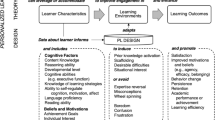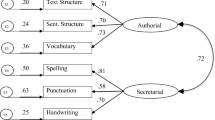Abstract
Should students receiving a review of previously learned material show better retention than nonreview students? Do students using audio-tutorial review retain more than students using only a study guide? Students at Highland Park Community College participated in a learning-retention experiment. Subjects were assigned randomly to one of four review groups: study guide only, summary audiotape; compressed-speech audiotape, and no review. Analysis of retention scores incorporated Bartlett’s statistic, ANOVAs, and Dunnett’st. A CTMM IQ test also was given the subjects.
Similar content being viewed by others
References
Aiken, E. G., Thomas, G. S., & Shennum, W. A. Memory for a lecture: Effects of notes, lecture, rate, and information density.Journal of Educational Psychology, 1975,67(3), 439–444.
Atkinson, T. J. A comparative study of the effect of audio taped instruction on student achievement in the level II ISCS program (Doctoral dissertation, University of Maryland, 1972).Dissertation Abstracts International, 1973,33, 678A. (University Microfilms No. 7309671)
Ausubel, D. P. Early versus delayed review in meaningful learning.Psychology in the Schools, 1966,3, 195–198.
Baker, R. L., & Schutz, R. E. (Eds.).Instructional product development. New York: Van Nostrand Rinehart, 1971.
Bausell, R. B., & Moody, W. B. The effect of programmed review on 4th and 5th grade arithmetic retention.School Science and Mathematics, 1972,72, 148–150.
Briggs, L. G.Handbook of procedures for the design of instruction. Pittsburgh: American Institutes for Research, 1970.
Campbell, D. T., & Stanley, J. C.Experimental and quasiexperimental designs for research. Chicago: Rand McNally, 1966.
Challis, J. A.The effect of fixed and learner selected rates of compressed speech in an audiotutorial learning environment on the achievement of college level students. Doctoral dissertation, University of Oklahoma, 1973. (ERIC Document Reproduction Service No. Ed 075 995.).
Cunningham, W. D. An evaluation of an audiotutorial algebra course at the junior college level (Doctoral dissertation, Arizona State University, 1973).Dissertation Abstracts International, 1973,33, 5431A.
Dayton, C. M.The design of educational experiments. New York: McGraw-Hill, 1970.
DiVesta, F. J., & Ross, S. M. Oral summary as a review strategy for enhancing recall of textual material,Journal of Educational Psychology, 1976,68(6), 689–695.
Ebbinghaus, H.Memory: A contribution to experimental psychology. New York: Dover, 1964. (Reprinted from original text, 1885)
Farlow, W. C.A comparative study of the effects of audio materials compressed by the speed changing method on the spelling achievement of elementary school students. Unpublished doctoral dissertation, Wayne State University, 1971.
Fisher, K., & MacWhinney, B. AV audiotutorial instruction: A review of evaluative research.AV Communication Review, 1976,24(2), 229–262.
Foulke, E. The retention of information presented at an accelerated word rate.The International Journal for the Education of the Blind, October 1966, 11–15.
Foulke, E.Annual report to the dean of the graduate school. Louisville, Ky.: University of Louisville, Perceptual Alternatives Laboratory, 1975.
Foulke, E. Personal communication, August 26, 1976.
Gagné, R.The conditions of learning. New York: Holt, Rinehart and Winston, 1970.
Gay, L. R. Temporal position of reviews and its effect on the retention of mathematical rules.Journal of Educational Psychology, 1973,64(2), 171–182.
Hirsch, C. R. The effects of guided discovery and individualized instructional packages on initial learning, transfer, and retention in second-year Algebra.Journal for Research in Mathematics Education, 1977,8, 359–368.
Hoffman, F. E., & Druger, M. Relative effectiveness of two methods of audiotutorial instruction in biology.Journal of Research in Science Teaching, 1971,8(2), 149–156.
Hovland, C. I. Human learning and retention. In S. S. Stevens (Ed.),Handbook of experimental psychology. New York: Wiley, 1951.
Johnston, A. E. Audio-tutorial versus traditional instruction at the Boone Junior High School (Doctoral dissertation, Iowa State University, 1969).Dissertation Abstracts International, 1969,30, 955A.
Langford, R. The effect of time-compressed speech on listening comprehension (Doctoral dissertation, New York University, 1968).Dissertation Abstracts International, 1968,29, 411A. (University Microfilms No. 68–11, 795)
McMillan, R. D., & Brown, E. J. Audio tapes as an instructional device in college mathematics.Journal of Research in Science Teaching, 1971,8(4), 369–371.
Morman, S. J. A comparison of an audio-tutorial approach and the traditional lecture-discussion approach to the teaching of remedial algebra in a junior college setting (Doctoral dissertation, University of Houston, 1971).Dissertation Abstracts International, 1972,32, 5673A.
Orr, D. Time-compressed speech — A perspective.The Journal of Communication, 1968,18, 288–292.
Peterson, H. A., Ellis, M., Toohil, N., & Kloess, P. Some measurements of the effects of reviews.Journal of Educational Psychology, 1935,26, 65–72.
Sones, A. M., & Stroud, J. B. Review with special reference to temporal position.Journal of Educational Psychology, 1940,31, 665–676.
Sticht, T. G. Some relationships of mental aptitude, reading ability, and listening ability using normal and time-compressed speech.The Journal of Communication, 1968,18, 243–258.
Travers, R. M. W.Man’s information system. Scranton, Pa.: Chandler, 1970.
Wheatley, J. H. A scheme for evaluating the audiotutorial biology laboratory in the cognitive and affective domains (Doctoral dissertation, Ohio State University, 1973).Dissertation Abstracts International, 1973,33, 4971A.
Woodcock, R., & Clark C. Comprehension of a narrative passage of elementary school children as a function of learning rate, retention period and IQ.The Journal of Communication, 1968,18, 259–271.
Author information
Authors and Affiliations
Rights and permissions
About this article
Cite this article
Smith, H.G. Investigation of several techniques for reviewing audio-tutorial instruction. ECTJ 27, 195–204 (1979). https://doi.org/10.1007/BF02765452
Issue Date:
DOI: https://doi.org/10.1007/BF02765452




